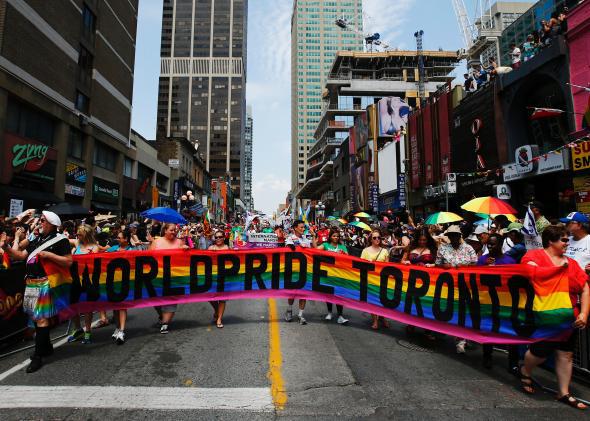Across North America and Europe, the streets have been awash in rainbows. Pride, that time of year when the LGBTQ community celebrates and cements itself as a proud, permanent fixture, has come to a close.
In Toronto, it’s not just local and regional LGBTQ communities packing up and heading home. As host of this year’s World Pride, meant to raise the international profile of LGBTQ issues—the next being 2017 in Madrid—Toronto saw activists from more than 50 countries come together to share their experiences and plan for the road ahead. After spending the last week in a city where nearly every hotel, storefront, bank, and frosted cake featured some type of rainbow design, many of these activists are now going home to communities that shun them, abuse them, denigrate them, and in some cases arrest and kill them.
When they do arrive home, however, they will not be forgotten. Global LGBTQ rights are in vogue right now. Presidents and prime ministers, vice presidents, secretaries of state and foreign ministers, and U.N. secretaries-general have taken up the cause. But in Toronto this week, some activists questioned the intensity of this focus and asked if we’ve been speaking up too much.
At a reading of her play about Uganda’s Anti-Homosexuality Bill, Just Me, You and the Silence, Ugandan playwright Judy Adong challenged the growing spotlight on LGBTQ rights. During a panel discussion, Adong read out a message from a Ugandan friend back home, which accused the West of abandoning a holistic focus on human rights—from women’s rights to freedom of expression—and adopting a singular focus on LGBTQ rights. The discussion about gay rights, Adong and her friend suggested, needs to be broadened and merged into the general dialogue about human rights in developing countries. Gay rights are no different than other rights. The West, she argued, should have been equally as outraged by Uganda’s newest controversial law banning miniskirts.
The truth is, though, gay rights are different.
In Jamaica, the LGBTQ population is denigrated and dehumanized in popular media in ways that would shock the most impartial of observers. Last year, a transgendered teenager was murdered by a mob. In Cameroon, men are imprisoned for sending text messages to one another that say, “I love you.” Last year, a leading gay rights activist was found tortured and killed in his home. And in Uganda, which often attracts much of the attention when it comes to global LGBTQ rights, the government just declared 38 human rights organizations illegal on the grounds that they “promote homosexuality.” This is the latest development in a country where leading LGBTQ activists are outed in the media, and where one of those outed was found murdered in his home in 2011.
Brian Nkoyooyo, a Ugandan activist who heads the LGBTQ organization Icebreakers Uganda, which is now illegal, told me that being in Toronto for World Pride was so overwhelming, he stopped “to almost shed a tear” at what he was witnessing.
Adong has a point about how the West goes about engaging with developing countries on LGBTQ rights. Public scolding in international forums and demands that Africans adopt Western interpretations of human rights have only emboldened leaders. Part of the reason for the popularity of Uganda’s Anti-Homosexuality Bill is that President Yoweri Museveni claims it is protecting traditional Ugandan values in the face of homosexuality—a Western import. That homosexuality has long existed in Uganda, its anti-sodomy law comes from British colonial rule, and American Evangelicals are behind the country’s anti-LGBTQ crackdown seems to escape him. Still, when it comes to parts of the world where our track record on human rights is less than laudable, we’re on slightly shaky ground, and we’d do better if we were more receptive to local perspectives.
But to be guilty of being a bit overzealous in defence of LGBTQ rights in the face of this emboldened persecution does not make the cause any less just or urgent. In the circumstances, the growing focus on LGBTQ rights is justified.
When the Indian Supreme Court recriminalized consensual sex between two adult men in December 2013 (it was de-criminalized by the Delhi High Court in 2009), it contrasted gay men with straight men with the wording “as compared to normal human beings.”
That’s the difference.
Socioeconomic rights that relate to health care and education, and civil rights related to freedom of expression and association are important to build free and fair democratic societies. But a society is not free and fair when it’s accepted in every church, courthouse, or parliament that members of the LGBTQ population are not “normal human beings.” When rights do not protect society’s most marginalized, they have lost their meaning and purpose.
Those who charge that the West focuses too much on LGBTQ rights in Uganda or elsewhere can’t see that this is about equality in its most basic and fundamental sense. Forget the freedom to associate, a right to basic health care or social assistance, or a Ugandan woman’s (or man’s) right to wear a miniskirt. At home, at work, on the street, and in the eyes of the law, entire populations are being denied the right to be, to exist as who they are. Their entire existence has become an act of defiance.
Until that changes, their struggle, and ours, will be different.
